Saturday's tour of Panmunjeom was surreal enough. But even before we got to the Joint Security Area, we stopped at Peace Land:
The clash of civilisations was never better dramatised than at Peace Land, in Imjingak, on the 38th Parallel. Here, the starving people of the world's nastiest dictatorship can look across the border at capitalism quite literally putting on a funfair. For the Southerners, of course, the North Koreans are the principal attraction.
Right alongside the Pirate Ship, the Wriggly Worm and all the other fantasy rides run the perfectly real electrified fences and watchtowers of the border. The organisers of the theme park provide special viewing platforms and free telescopes for visitors. A key attraction is a bombed-out steam locomotive, still standing on its original tracks in front of a blown-up railway bridge across the River Imjin marking the frontier.
In fact, this bombed-out locomotive:
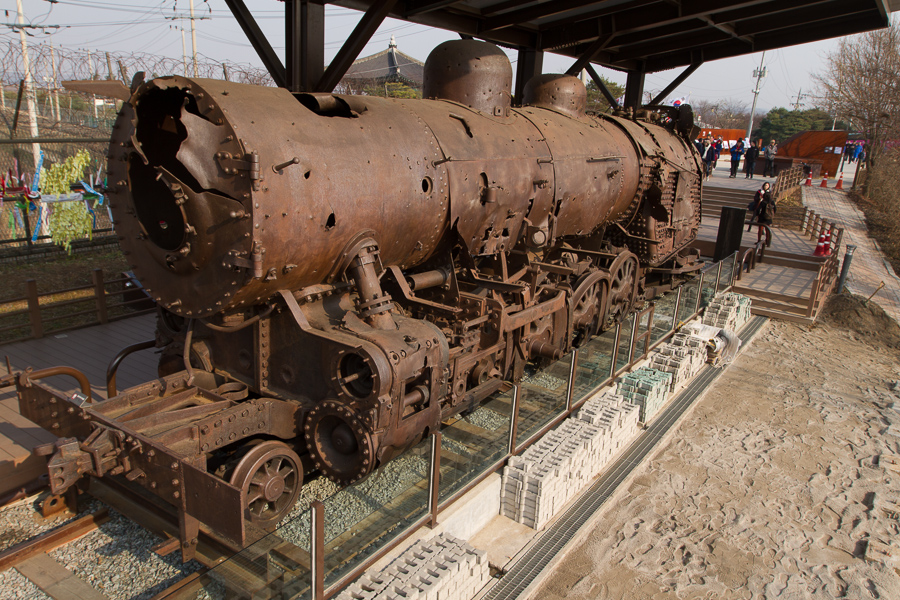
And that blown-up railway bridge:
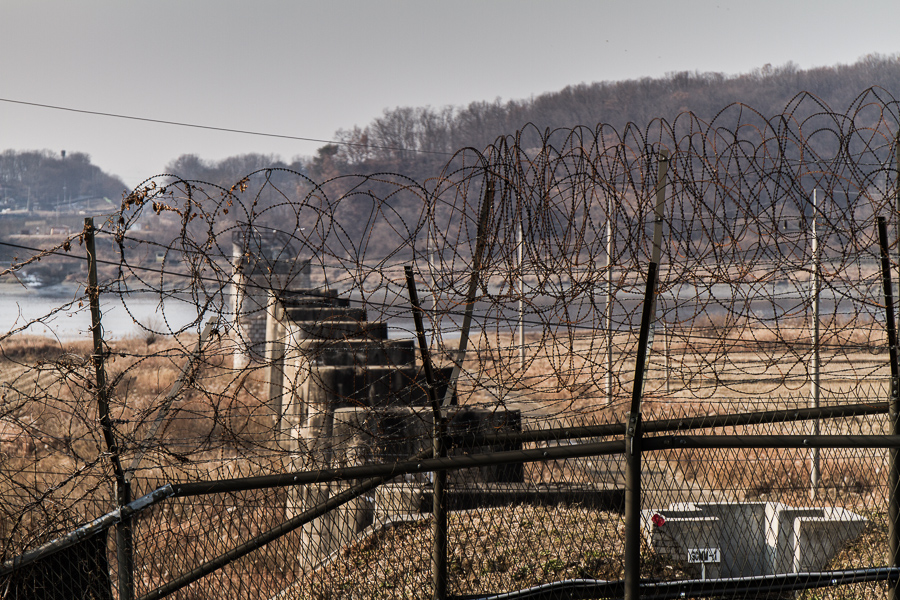
See that barbed wire? Understand, that's not part of the theme park. Those are a real, live, deadly anti-personnel defenses that the theme park incorporated into its exhibits.
This theme park, to say the least, confused me. So I asked our tour guide why they have a fun fair within sniper distance of North Korea. She said that when relations with North Korea improved in the 1990s and early 2000s, people would meet their North Korean families nearby, so they'd bring their children to Imjingak for a few days. So, in the midst of this reminder that the Korean War has never really ended, they built a bunch of rides the kids can enjoy.
This is one more piece of data in figuring out Seoul. Yesterday I got a lot more, which I'll lay out in a few minutes.
Yesterday I spent four minutes in North Korea. Proof:
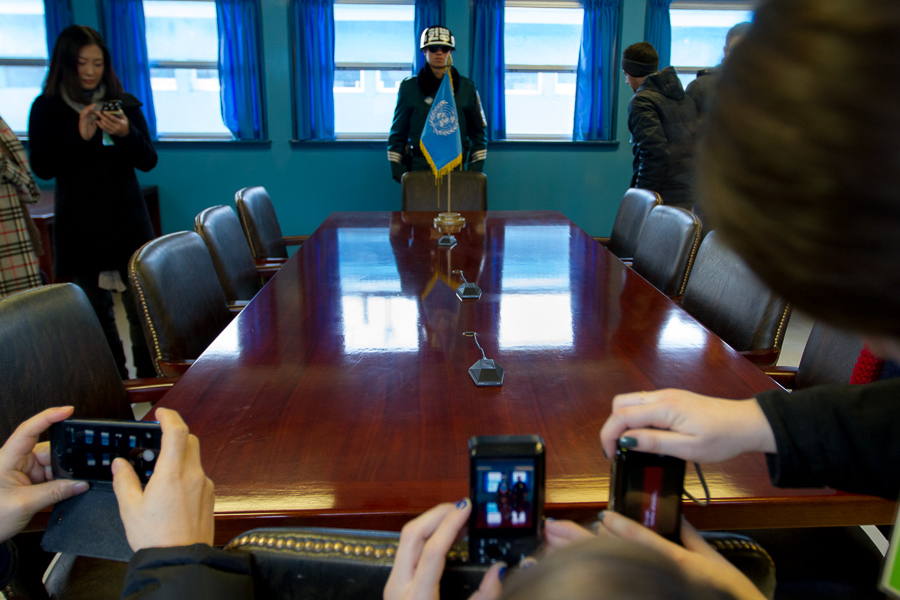
That's inside the Military Armistice Commission (MAC) conference building, within the Joint Security Area near the village of Panmunjom. The line of microphones on the desk follows the Military Demarcation Line (MDL) dividing North and South Korea. To my left is South Korea; to my right is North Korea.
You have to take an organized tour to get to the JSA. Because, let's review: (a) it's an active war zone; (b) it's a diplomatic base with heavy military presence; and (c) you don't want to get kidnapped by the DPRK. (The tour I took cost $78 and included a delicious bulgogi lunch at a roadhouse outside Puja.)
Here's the first up-close-and-personal view of North Korea you get:
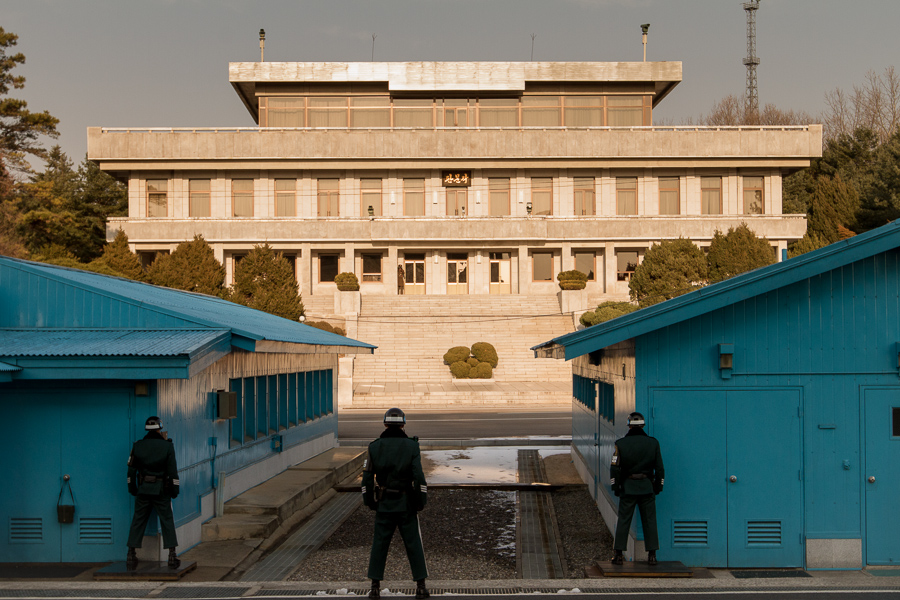
The blue building to the left is the MAC Conference Center from the photo above. The blue building to the right is another ROK-administered structure. Running between them, on the ground, you can see a raised concrete curb about 10cm tall. That is the MDL—the border with North Korea. Assuming you could get past the armed U.S. Army guys I decided not to photograph, and get past the ROK officer in the center, and the two beefy MPs on either side, you could make that border in just a few steps from where I was standing. Then you'd have a really difficult time getting back over it, and a harder time, whether or not they let you back in South Korea, staying out of jail on one side or the other.
It's surreal. The border is an abstract concept but two enormous armies make connect the abstraction to reality. A bunch of tourists, half of them Japanese, took an ordinary tour bus to a United Nations military base a few hundred meters from a hostile country, got a slide show about axe murders and not gesturing to or speaking with North Koreans, then got on a U.N. bus and drove—slowly—past mine fields, tank defenses, and rice paddies. (About 700 people live just outside the JSA, within the DMZ.)
Here's another chilling place, the Bridge of No Return:
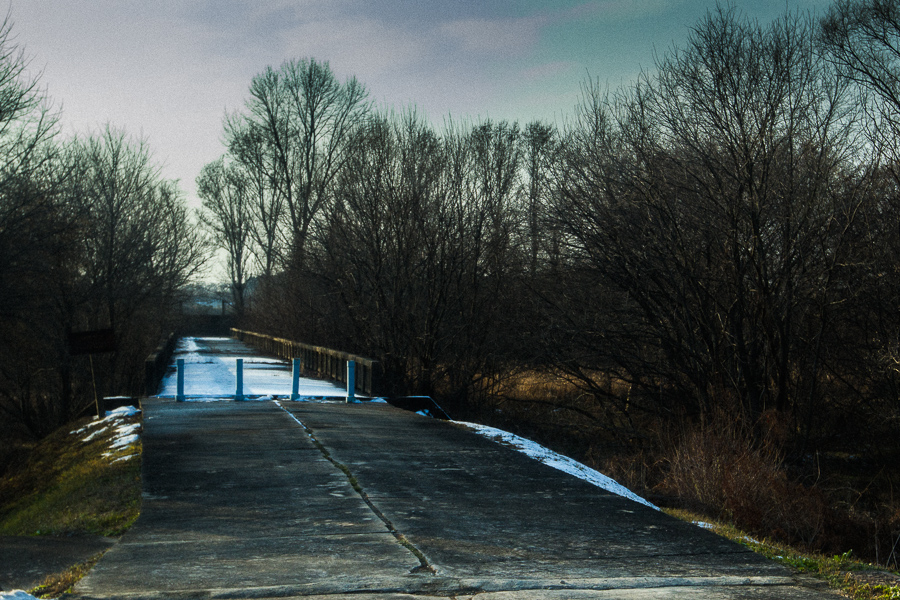
Yeah, don't cross that bridge. You won't come back. Seriously.
Today I'm heading over to the Korean History Museum and possibly the War Memorial. I've been thinking a lot about Seoul and my reactions to the city. At first approximation, modern Seoul is defined by a war that hasn't ended.
In just a few days, back in the real world, my cousin and I will troop over to Wrigley Field to see if we want to move our season seats. Tribune reporter Josh Noel will not be there:
I signed up seven or eight years ago, back in the carefree days of the Cubs hovering closer to the orbit of playoff contender than worst team in baseball. Sure, they hadn't won a championship in nearly 100 years, but (cue the Cubs fan delusion) I'd grown up blocks from Wrigley Field and seen countless games in what remained one of baseball's most pastoral settings. The team was a free-spending, major-market bunch, and eventually the corks would start popping. When they did, I would be there.
Fast forward to the present. The Cubs are lousy again. Two of the team's best young players regressed last season. The manager picked to lead the team to a new era of respectability was fired after two seasons. Ownership is jockeying to turn a classic Chicago neighborhood into a giant Hard Rock Cafe (though to be fair, Wrigleyville's Hard Rockification began before the Ricketts family showed up).
Wrigley Field attendance has dipped five seasons in a row; last year's 2.64 million was the lowest tally in 15 years. Such decline, in theory, helps explain how my place on the waiting list finally came up. The Cubs ticket saleswoman laughed ruefully when I expressed surprise at her call.
So how did one of the most coveted tickets in town fall out of favor? Taylor has a theory: "Wrigley is fun, but winning is even more fun.
We went through the same calculation, but we decided last year to do it anyway. And who knows? They might win 70 games this year. Or 80.
Two years ago this week, I used a bunch of miles and hotel points to go to Tokyo, and had a great time. That was the week that American Airlines—whose frequent-flyer program had gotten me to Japan—filed for bankruptcy protection. Also that week, journalist James Fallows wrote a blog post about to the ban on using small electronic devices on takeoff and landing.
Well, on my flight to Korea Wednesday, I could use small electronic devices, because the FAA rescinded the ban last month. And right before the flight took off, the U.S. bankruptcy court approved American's merger with US Airways, clearing the way for the airline to exit bankruptcy protection soon. The airlines will consummate their merger on December 9th.
I post this in case you wanted an update about my post from two years ago today. (The post was about American's reassurances to us frequent fliers that, yes, our miles were safe. Yup, they were.)
This is why I blog.
And now that the first glimmer of daylight has appeared, I will now shower and look for coffee. Last night I made it almost until 9pm, and I woke up around 4:30am, so I'm almost adjusted to the +15/-9 hour difference. Almost.
Photos from this afternoon. First, a traditional house (Hanok) in the Bukchon district:
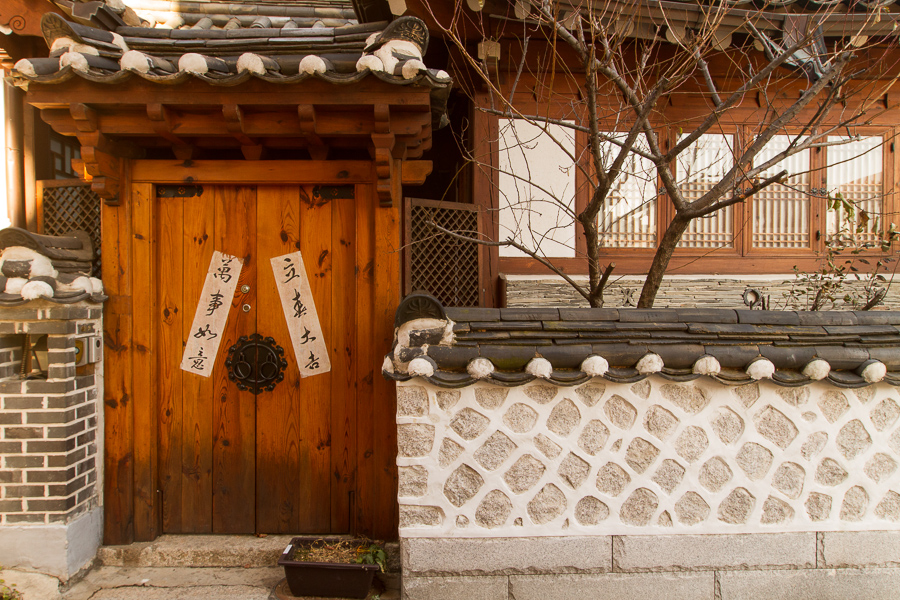
And a traditional set of steamed dumplings not far away:
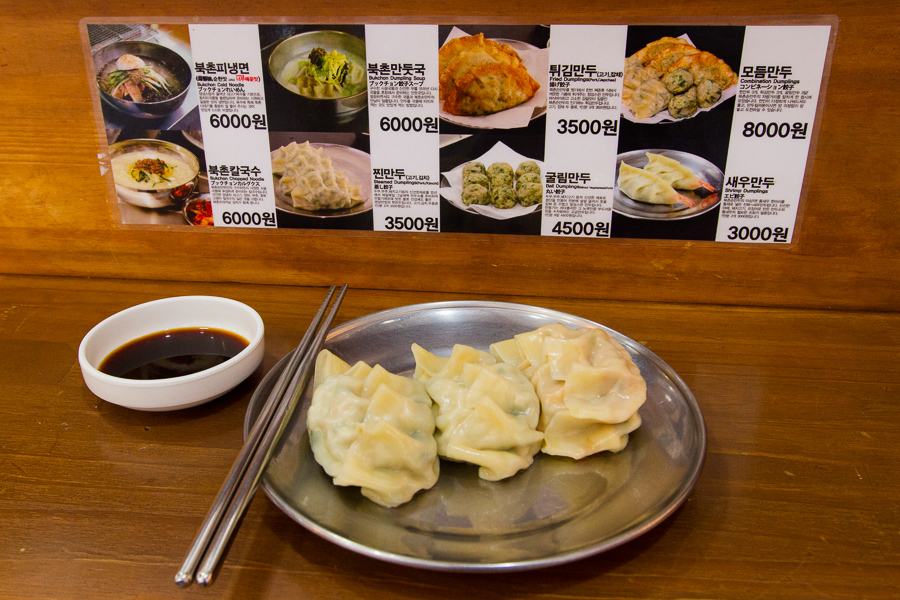
And, finally, a traditional faux-Irish bar in Itaewon, the expatriate district:
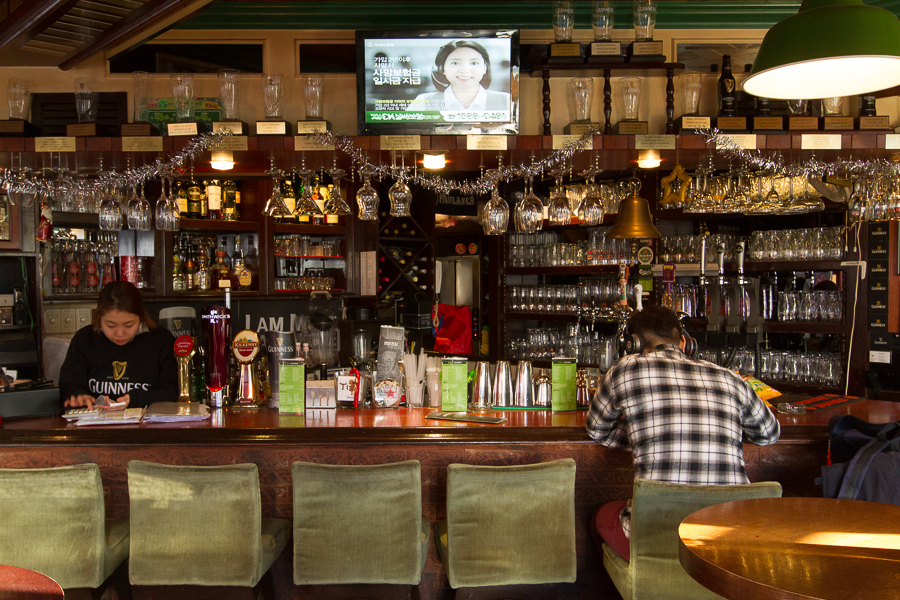
Tonight, I am in search of galbi, and then I hope to stay awake until 10pm. Tomorrow, Panmunjom.
Remember how I said prices are pretty good in Korea? And remember how I said I forgot my Lonely Planet guide? Yeah, you can connect the dots here.
Lonely Planet: Seoul, December 2012 edition. On Amazon, $17.86. In Seoul, $28.40. That, folks, is a tax on my stupidity. Especially since the Kindle edition is $2.99 because I purchased the print edition. It might have made sense to buy that in Dallas, don't you think?
Also, Guinness is not cheap here at $10 per Imperial pint. That, folks, is an actual tax. At least there's no tipping in Korea.
In no particular order:
- These are the politest people I've ever met, and they all really want to speak English. It's like an Asian Toronto.
- A single LED by the door with a motion sensor makes a lot of sense. A 5 cm step up just inside the door does not.
- You can't turn off the automatic bidet; best find out how to turn its heater on ASAP.
- Why get a hotel room when you can get a little studio apartment, complete with British-style washer-dryer by the sink, for $50 a night less? Across from a 7-11, even?
- I know now why this trip was cheaper than going to London: it's colder here (-3°C) than back home (-1°C).
- The won right now is 1,061 to the dollar at wholesale. That means, given a reasonable spread for retail, to convert won prices to dollar prices you just lop off three zeros.
- Prices here are about the same as home for goods and a fraction for services. Express train from the airport? $8.50. Cup of coffee? $1.50. Flaming-hot ramen noodle cup from 7-11? $1.25.
- Transitioning 11½ hours (India) is easier than transitioning 15 (here). I do not know why.
- Being an American, it's completely unsurprising back home when someone who looks nothing like me speaks perfect English. This is normal; Americans look like everybody. But here, when someone who looks just like me doesn't speak a word of English, I find this bizarre. Note that I do not find this bizarre when traveling in Europe. I must think more about this.
I have obtained a map and the location of a large bookstore, so I will now explore the city.
Yesterday, on the Siberia side of the Bering Sea:
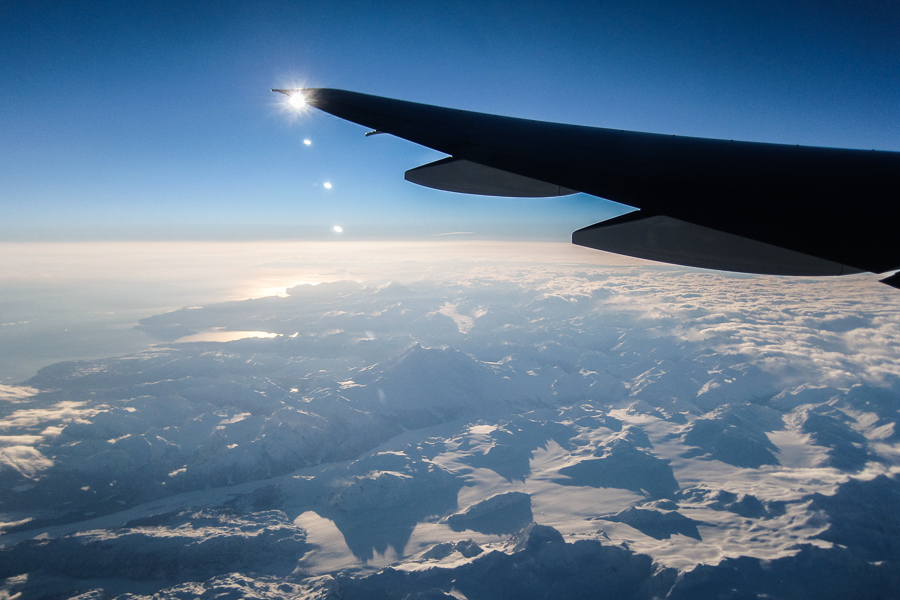
Our flight path yesterday followed the terminator as the earth turned. The sun stayed right on the tip of the left wing for about 90 minutes before we jogged slightly west over Kamchatka.
First, housekeeping. After my last entry I managed to stay up for about 30 minutes, then slept for almost 7 hours. If you do the math you see that means I was up before 3am. So, even thought it's 1pm on Thanksgiving back home, I did some client work to clear it off my agenda for the rest of the week.
Now the point of this post:
Toronto’s plan to save Bixi transfers the bike-sharing program to the Toronto Parking Authority, turns over management to a Portland-based firm and uses money from Astral Media that was going to be spent on public toilets, the National Post has learned.
The deal, approved at a closed-door meeting of city council 10 days ago, will also see Toronto “eat” the $3.9-million in loan guarantees that the city gave to Bixi, owned by the City of Montreal, according to a source.
The city is negotiating with Portland-based Alta Bike Share, which manages Chicago's Divvy program, among others.
I've been awake for about 22 hours now, and it's starting to show.
But yes, I'm in Seoul. I'm going to bet I'll wake up really early tomorrow as my body has no clue what day or time it is. My experience with really huge time shifts makes me optimistic that I'll adapt in a day or two.
I have not adapted yet, however. I just need to make it until 8pm...
Oh, and sometime after regaining consciousness I'll correct the time stamp on my previous entry.